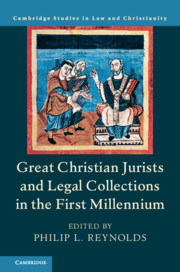Book contents
- Great Christian Jurists and Legal Collections in the First Millennium
- Law and Christianity
- Great Christian Jurists and Legal Collections in the First Millennium
- Copyright page
- Contents
- Contributors
- Preface and Acknowledgments
- Abbreviations
- Part I
- Part II
- 10 Lactantius
- 11 Ambrosiaster
- 12 Augustine of Hippo
- 13 Leo the Great
- 14 Gelasius I
- 15 Dionysius Exiguus
- 16 Benedict’s Rule
- 17 Gregory the Great
- 18 Isidore of Seville
- 19 Pseudo-Isidorus Mercator
- 20 Jonas of Orléans
- 21 Hincmar of Reims
- 22 Regino of Prüm
- 23 Burchard of Worms
- 24 New Horizons in Church Law
- Index
- References
20 - Jonas of Orléans
from Part II
Published online by Cambridge University Press: 21 June 2019
- Great Christian Jurists and Legal Collections in the First Millennium
- Law and Christianity
- Great Christian Jurists and Legal Collections in the First Millennium
- Copyright page
- Contents
- Contributors
- Preface and Acknowledgments
- Abbreviations
- Part I
- Part II
- 10 Lactantius
- 11 Ambrosiaster
- 12 Augustine of Hippo
- 13 Leo the Great
- 14 Gelasius I
- 15 Dionysius Exiguus
- 16 Benedict’s Rule
- 17 Gregory the Great
- 18 Isidore of Seville
- 19 Pseudo-Isidorus Mercator
- 20 Jonas of Orléans
- 21 Hincmar of Reims
- 22 Regino of Prüm
- 23 Burchard of Worms
- 24 New Horizons in Church Law
- Index
- References
Summary
Jonas, bishop of Orléans during the first half of the ninth century, was a key figure in emperor Louis the Pious’s efforts to develop and diffuse Christian models of behavior for the different social groups of the Carolingian empire. Moral control over society, in his view, was the means for the emperor to achieve and fulfill his “ministry,” by which he would lead his people to eternal salvation. This chapter examines Jonas’s contribution to the construction of a moral and normative architecture for Carolingian society both through his writings and through his participation in church councils. Through his writings, which range from hagiography to moral and doctrinal treaties, and which are based on collections of quotations from the Bible and from the Church Fathers, Jonas developed moral rules for social “orders” (classes) that still lacked them, such as laypeople and kings. Passages from these works were later inserted within the acts of the councils that he attended (and in some cases presided over), thence becoming normative as a form of law for the empire. The chapter shows how Jonas used Christian tradition to build the Carolingian ecclesia.
Keywords
- Type
- Chapter
- Information
- Publisher: Cambridge University PressPrint publication year: 2019

